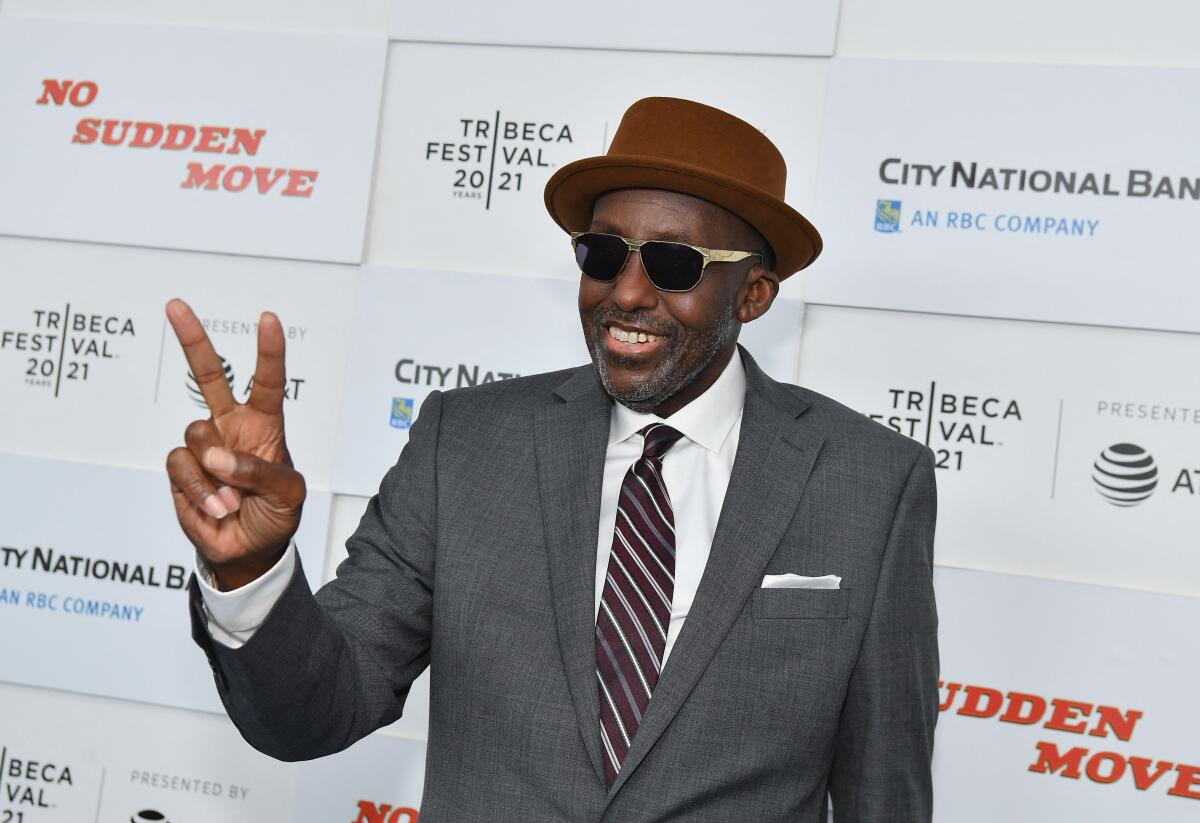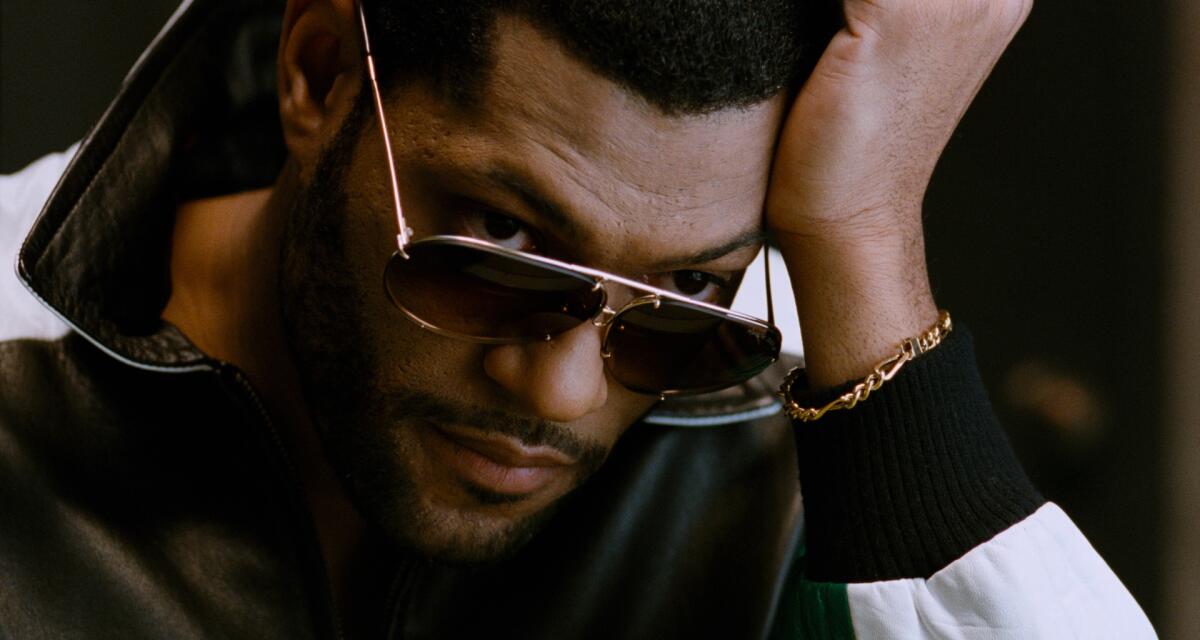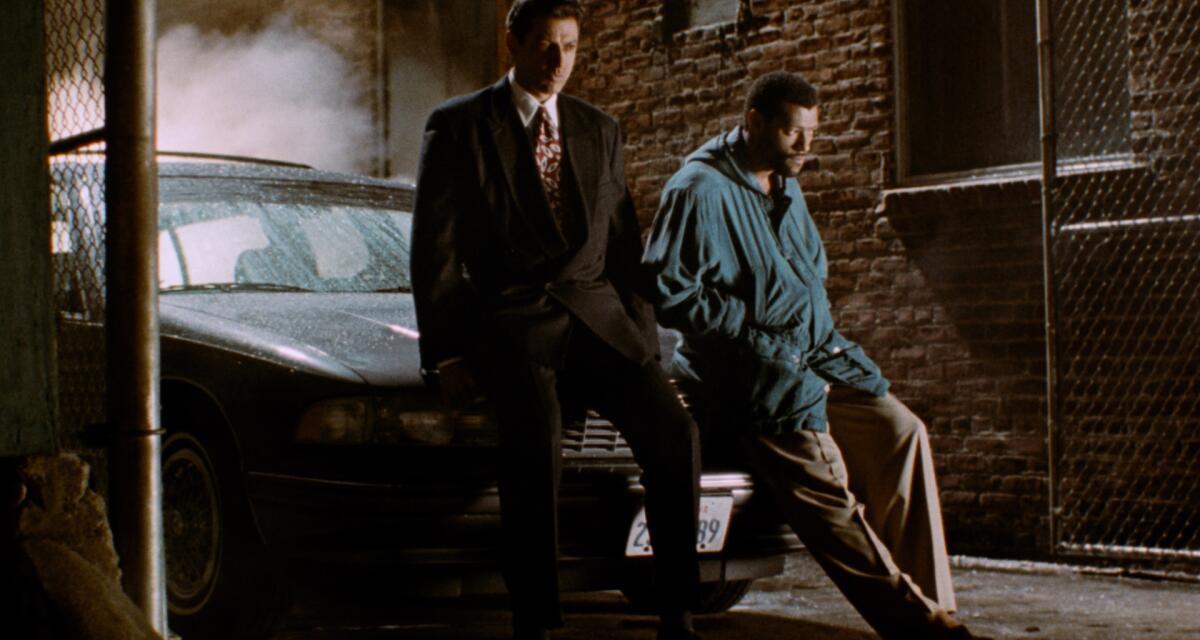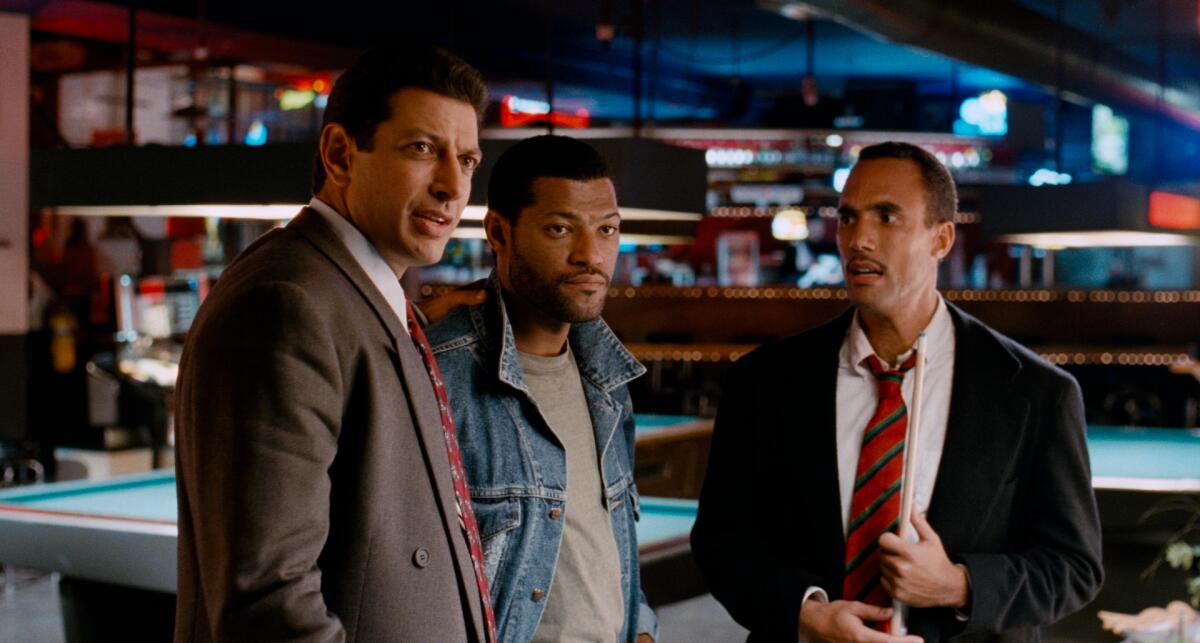Bill Duke on ‘Deep Cover’ and Hollywood’s gatekeepers

The incredible breadthof actor and filmmaker Bill Duke‘s career has been on display recently, with a spotlight on projects new and old.
Duke plays a pivotal supporting role in the new Steven Soderbergh film “No Sudden Move” on HBO Max. His 1984 film “The Killing Floor,” about a unionization effort among slaughterhouse workers in World War I-era Chicago, was celebrated at this year’s Cannes Film Festival. And his 1992 film “Deep Cover,” starring Laurence Fishburne, Jeff Goldblum and Clarence Williams III, has just been released on home video as part of the Criterion Collection.
Duke first came to audiences’ attention as an actor, with roles in films such as “Car Wash” and “American Gigolo.” In the early ‘80s, he moved into directing, first working in episodic television on series such as “Dallas,” “Falcon Crest,” “Knot’s Landing” and “Hill Street Blues.” At the same time, he has continued to act, appearing in films such as “Commando,” “Predator,” “Action Jackson,” “Menace II Society” and Soderbergh’s “The Limey” and “High Flying Bird.”
“The Killing Floor” aired on PBS but also screened at Cannes and Sundance where it won a special jury prize. His theatrical feature directing debut came with the 1991 Chester Himes adaptation “A Rage In Harlem.” Among his other directing credits are “Sister Act 2: Back in the Habit,” “Hoodlum” and the documentary “Dark Girls.”
“Deep Cover” was adapted by Henry Bean (“Internal Affairs”) and Michael Tolkin (“The Player”) from the book by former DEA agent Michael Levine. In the film, Fishburne plays a cop recruited to go undercover among L.A.’s drug dealers, rising in the ranks alongside a shady lawyer played by Goldblum. Brimming with the energy of that era’s hip-hop music and with an evocative, expressionist look, the film presents a topsy-turvy world in which crime kingpins play golf with politicians and the least trustworthy character is Fishburne’s superior, played by Charles Martin Smith.
The film explores the tension between the polished sheen and seedy underside of early ‘90s Los Angeles, much as “To Live and Die in L.A.” and “52 Pick-Up” did for the ‘80s. Comparing “Deep Cover” to classic film noirs, critic Angelica Jade Bastién recently wrote that the film “takes the familiar attributes of the genre and uses them to confront questions about black masculinity, the reach of state-enacted violence, and the futility of trying to fix a decaying system from the inside.”
From his home in Los Angeles, Duke spoke recently about “Deep Cover” and facing down the literal gatekeepers of Hollywood throughout his career.

What inspired you to make that initial transition into directing?
Bill Duke: I started out as a writer and director of theater in New York and I wrote my own plays and directed some of them. I always was interested in film, but I was intimidated by the equipment, the size of the crews, the cameras, everything. So I just stuck to directing theater. I got a show called “Palmerstown, U.S.A.,” [created by] Norman Lear and Alex Haley. We were on for two seasons. And after that, I didn’t work for two years. So I said, you know something, you better get over your fears. So I applied to the American Film Institute under Tony Vellani and the rest is history. I mean, at that time, AFI was the bomb place to be in terms of understanding the craft of directing. So I was very fortunate.
Was that a difficult decision to make, to enroll at the AFI? I wonder if starting your directing career somehow felt like a failure in your acting career.
Duke: This is the business of rejection and they tell you to get over it, but you don’t. Because it has an emotional impact on you, a psychological impact on you. And so you have to continue to dig yourself out of holes. Fortunately, I have meditation in my life, certain spiritual things in my life and friends that help support me. So with that combination, I was able to get through those tough times, but no matter who you are, those tough times keep coming. As you age in the business, it gets worse. So it’s like, thank God I was able to continue.
How did you come to direct “Deep Cover?” It’s an adaptation of a book by a white drug enforcement agent adapted by two white screenwriters that becomes a film directed by Bill Duke and starring Laurence Fishburne.
Duke: New Line saw some of my work and invited me into a meeting. I pitched them my vision, et cetera. And they got it and it was a great collaboration. That’s before they got the big films; they were an independent film studio. And even though it was initially a white hero, at that particular time drugs were obliterating the Black community. And so it was more relevant to a great extent, but one of the things in the book and in the script that we dealt with, which I was really happy and proud of, is that before that, films dealt with drugs on the street, the people that actually sold the drugs on the street.
But in the book, he says, “wait a minute, the people that are selling it on the street, they’re being punished, put in jail, murdered, but they’re not growing it, they’re not shipping it in, they’re not manufacturing it. Why don’t we go after those people?” He tried to go after them. And he was fired because the upper echelon people have protections. There’s an old saying that a lawyer friend told me years ago. He said, “Do you know the distinction between a good lawyer and a great lawyer?” I said, “No.” He said a good lawyer knows the law. A great lawyer knows the judge.

The movie captures Laurence Fishburne at a very powerful point in his career. How did you come to cast him?
Duke: What Laurence has, he understands silence. Watch his work; he’s a great listener. It’s like music. The only reason that music exists is because of the rests in between the notes and Laurence is not afraid to rest and respond to you. Not with lines, but respond to you based upon not only what you said, but how you said things, and for that, you have to listen. So watch his work. You’ll see he’s a great listener and it comes organically out of what he just heard.
He and Jeff Goldblum have such great chemistry. At times the movie becomes almost like this crazed buddy film. And you really leaned into that, letting them improvise. As a director, how do you recognize that chemistry and elevate it?
Duke: It’s very fortunate I’m an actor also. So I really feel the characters that I’m directing. And I feel for the actors and I know what they’re trying to do emotionally and craft-wise. And so there comes a point at which if you don’t trust your director, it’s over. And so I brought them to a point of trust and that they could rely on each other. And once that happened, they really trusted each other and trusted what I was doing with the story of the film. And so I was very fortunate because I coached them as a director who understood and trusted actors.
You mentioned the drug epidemic of the time you were making the movie. The first shot of the movie is a slow-motion image of two guys smoking crack. It’s really unnerving and also unusual in that those are not the lead characters. As a viewer you don’t really know who those guys are and what you’re looking at. What did it mean to you to be exploring that world at that time?
Duke: Well, they were the leads of the film to me in the sense that these are the people that are being impacted by what I’m going to show you. They were young. Then we went back to the crack house. We saw the deprivation, what those drugs do to the human psyche, physiology. I mean, I was into drugs at one time and drugs are no joke, And withdrawing from drugs is a full-time, 100% courageous act. If you were into alcohol and drugs, it takes a lot to kick that. So I wanted to really address the fact that drugs are no joke. And people will relate drugs to the street. I wanted to relate drugs to the corporate offices in this nation.
You did an interview with the L.A. Times in 1992 about the number of films with Black directors coming from Hollywood at that time. But you said “I’m not interested in making ‘Black’ movies. I’m interested in making movies that reflect my reality as I perceive it.” And you said, “I see these as American films.” Do you feel that at that time in Hollywood, the business, and also the media, were trying to shoehorn all Black filmmakers together? What was it like at that moment?
Duke: I will give you an example. I directed a film called “The Cemetery Club.” Diane Ladd and Olympia Dukakis. And I loved the play on Broadway and they brought it to me and we all worked on the script because it was about death and mourning people. When someone dies, how do you feel? What happens to you? These three women’s husbands died and they created this cemetery club and helped each other bury the husbands, helped them mourning after. We took the film around the world.
And here’s the question I was consistently asked, “Mr. Duke, this is a film about three white females and you’re a Black director. Why are you directing three white females?” And I said, “Well, I’ve had people die in my family. I mourned. And I related to that because of what I’ve been through.” And they said, but you’re a black director. And I said, but Steven Spielberg just directed “The Color Purple.” And here’s what got me, man. This happened at least 10 times, different interviewers can look at me when I say, well, Steven Spielberg directed “Color Purple.” They look at my face and say, without any malice at all, “But that’s different.” How do you deal with that? “But that’s different.”
And I’ll give you another example. I was the first Black director on “Dallas.” I drove up to the gate, rolled down my window. The security guard looks into the window and he says, “Who are you delivering for?” “What did you say?” “I said, who are you delivering for?” As I’ve said in several other interviews, I wanted to say, “I’m about to deliver a can of whoop-ass to you.” But I would have been the angry Black man in Hollywood. So instead I said, “I’m delivering my talent as the first Black director on ‘Dallas,’ would you please open the gate?” The most gratifying thing was the look on his face. He almost let out a little gasp. That was great for me.
But when you’re just trying to make your films and Hollywood is bringing its baggage to you, how do you deal with that? How do you continue to move forward to make the films that you want to be making?
Duke: Well, I don’t work a lot. They consider me a renegade or too old or whatever you want to call it. But I keep developing my own content, documentaries, et cetera. But you know, Hollywood is not an easy place to be. And so if you try to stand by your integrity, there are compromises you have to make, but you have to choose those compromises wisely because in media, when your name goes on a film, it’s on there forever. Your great-grandchildren will see that. So sometimes you’ve got to compromise to pay the bills. Other times you’ve got to stand up for your principles.

About a year ago there was a New York Times article on the lack of films by Black filmmakers released by the Criterion Collection. And now “Deep Cover” is coming out, along with Dee Rees’ “Pariah,” Gina Prince-Bythewood’s “Love and Basketball” and a box set of films by Melvin Van Peebles. What does it mean to have your film recognized this way?
Duke: I think it’s wonderful. We all like to be recognized for our work. Self-recognition is first, but when people say you’ve done good work and what you created communicated with them and they appreciated what you did and they want to reward you for it, that’s always positive. Because as you know, directing a film is hard work. People don’t understand. I wish they could have people behind the scenes, seeing what we really do and all the challenges we face. And then you get a final product and you’re hoping that people relate to it in the way that you intended them to. No guarantees, but you hope that they will. But it’s work. Hard work.
What do you think of this idea of the film canon and that there are gatekeepers, people making decisions about what films are considered worthwhile. Whether it’s work from Black filmmakers or a crime picture, what do you make of who decides what movies are worth consideration?
Duke: It’s a very difficult space to be in because who’s determining the worth of it? What is their experience? Do they know anything about character arc, story arc, what you’re trying to say with the film? As creative people, it’s hard to be put into a box and be creative at the same time. Because your creativity becomes about the box. And so you’re like, “I want to breathe. Could you open the top?” “No, not right now, maybe next year.”
More to Read
Only good movies
Get the Indie Focus newsletter, Mark Olsen's weekly guide to the world of cinema.
You may occasionally receive promotional content from the Los Angeles Times.











